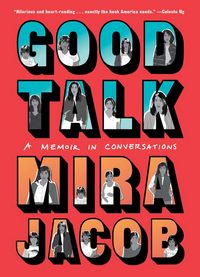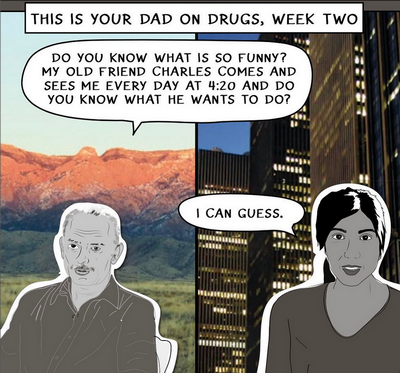 Good Talk:
Good Talk:
A Memoir in Conversations
by Mira Jacob
DETAILS: Publisher: One World Publication Date: March 25, 2019 Format: Hardcover Length: 349 pg. Read Date: October 5-6, 2022

Sometimes, you don’t know how confused you are about something important until you try explaiing it to someone else.
What’s Good Talk About?
It’s 2014 when the book opens, Mira Jacob’s son Z is six and he’s asking Mom a lot of questions (because he’s six). They start off talking about Michael Jackson—Z is obsessed with him. Z eventually asks about Jackson’s skin color—Z is half-Jewish, half-Indian and has several questions about skin color that stem from this (and likely predate this, but what do I know) which leads to questions about race, race relations, and what he sees on the news. Jacob’s committed to being open and honest with Z, but struggles knowing how much she should say—and how optimistic she should be about the state of the US in terms of Ferguson, MO, and a lot of the rhetoric surrounding the 2016 elections.
The memoir comes in as Jacob recounts several scenes from her childhood/young adulthood that shaped her. Her parents immigrated from India in the 60s (a week before MLK was assassinated) and took up residence in Albuquerque. We get a few scenes from her childhood and teen years before moving to adulthood, dealing with misunderstandings, assumptions, and unintentional rudeness based on her background. Eventually, she finds herself in New York City trying to make it as a freelance writer and dating. This is all told with frankness and humor. The kind of humor that reminded me of Amber Ruffin/Lacey Lamar’s You’ll Never Believe What Happened to Lacey from last year—you laugh so you don’t have to cry.
The Art
I really don’t know how to describe the art here, but this is a graphic memoir, so it’s a major component of the book. So I’d better try.
I saw someone on Goodreads use the term “mixed media,” and without researching it, I think it’s close enough to use as a description (maybe not technically right?). Please note that this is me trying to describe it, not being dismissive as it may sound. It’s like Jacob drew nice, but not fantastic, paper dolls of each character (some at different ages, others static) and put them on top of photographs or drawings of various locations and added speech bubbles.
I just saw that she has an Instagram account that uses images from the book (in addition to the regular Instagram stuff), so I figure I can “quote” something to show what I’m talking about:
This is nowhere near the kind of art that appeals to me in graphic novels/memoirs etc. Give me something dynamic, something with some flair, something I can bask in. But…this really worked for me. It helped give this a “documentary” kind of feel (don’t ask me to explain this, but it struck me that way). This isn’t about the glitz or the pictures jumping off of the page, it’s about a woman having tricky conversations with her loved ones—and complete strangers, sometimes. The focus is on the words, but the images help carry you along.
So, what did I think about Good Talk?
Sometimes, you go along with it and pretend nothing happened. Sometimes, you hold your breath until the feeling of wanting to believed passes. Sometimes, you weigh explaining against staying quiet and know they’re both just different kinds of heavy. Sometimes, when it’s your mother-in-law—a woman you started calling Mom the day you got engaged because you admired the ferocity with which she loved her children, and maybe even wanted some of it for yourself—you look ahead and see all the years of birthdays and graduations and weddings that will be shadowed by things that she can’t imagine about your life. Sometimes, you can’t hold your breath long enough.
I typed “I really enjoyed this book”, but I’m not sure that’s the appropriate response. I don’t know that supposed to enjoy this—but her style and humor are really engaging and there’s enough hope in there that it feels natural to say. I feel okay saying that this is a good read—it’ll make you think, it might make you grin, and it’ll definitely make you wince.
Right away, when Jacob goes to visit families in India and they tell her that her skin tone (darker than her parents’ or her brother’s) marks her out as not as attractive or a good prospect for marriage, you can tell she will pull no punches. And you can understand why she wouldn’t want to. It’s one of the many, many things that guys like me on Scalzi’s Lowest Difficulty Setting don’t have to think of. There are many sections of the book that hit the same way—like the chapter where she talks about being mistaken for “the help” at a party her mother-in-law was hosting. The above quotation is part of that—she decides mid-way through the conversation that she’s not going to try to explain what happened, nor argue about it. Constantly having to explain your experiences—your life—to people who don’t get it has to be a kind of exhausting that I can’t imagine.
But there’s a lot of humor and hope here, too—not all of it at the expense of clueless white folk saying dumb things. There’s the chapter about getting her dad to use marijuana to help the pain of his cancer treatment, for example. It’s funny and heart-warming. Until he dies, of course, reminding you that this isn’t that the hope is tinged with reality.
I really recommend this book—it’s a deceptively easy read, and you shouldn’t let the style or format fool you into racing through it. There’s a lot to chew on, a lot to reflect on—and a perspective that should be listened to. Even if you can’t relate to her struggles, can’t agree with her politics, and find the whole discussion unsettling. Maybe especially then.

This post contains an affiliate link. If you purchase from it, I will get a small commission at no additional cost to you. As always, the opinions expressed are my own.
![]()





Allyson Y Johnson
Great review! You really put some thought into it – I warned you the book would stretch your brain in some uncomfortable directions!
HCNewton
It absolutely did stretch me.
Thanks for the kind words!